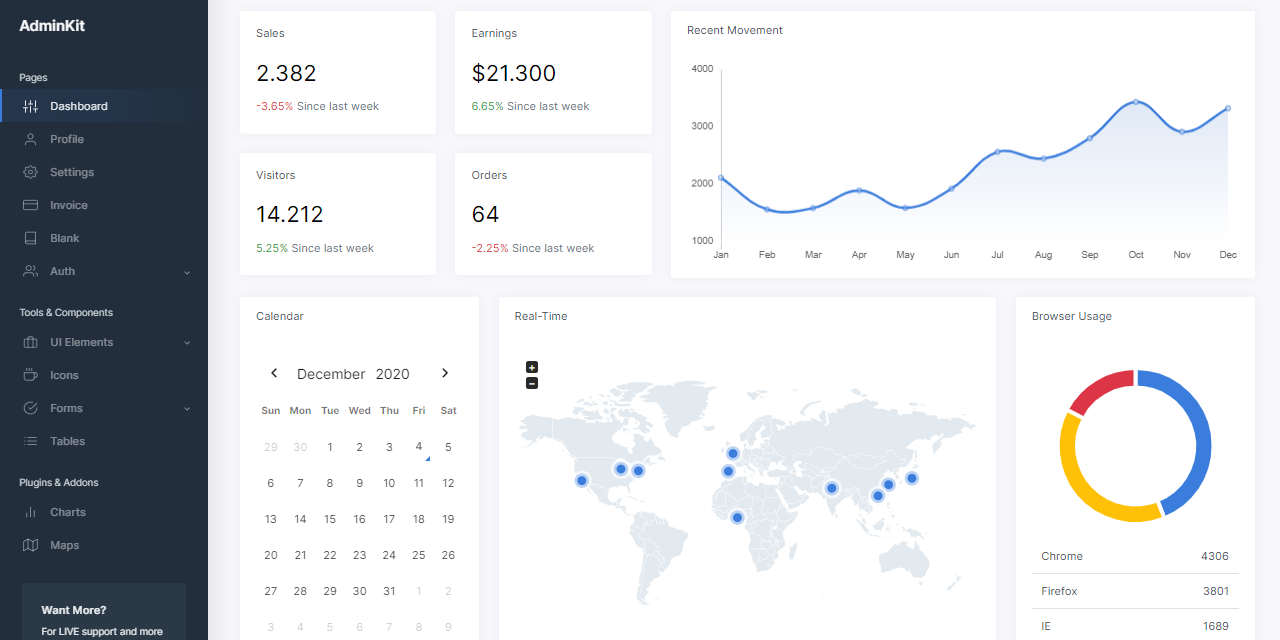AdminKit - A modern Bootstrap 5 template now available in Flask and Django (MIT License)
AdminKit, a professional admin dashboard template based on Bootstrap 5 is now available for download in Flask and Django.

AdminKit, a professional admin dashboard template based on Bootstrap 5 is now available for download in Flask and Django. The products, released under the MIT license, can be used for unlimited hobby & commercial products.
Thanks for reading! TL;DR;
- AdminKit - (HTML) product page
- AdminKit Flask - source code and LIVE Demo
- AdminKit Django - source code and LIVE Demo

AdminKit - UI Kit
This modern template is released by AdminKit.io under the MIT license. The project can be downloaded directly for Github and compiled via modern tooling.
Vendor Notes - A professional package that comes with hundreds of UI components, forms, tables, charts, pages and icons. Built on top of Bootstrap 5.
Built with Bootstrap 5 - Built on top of the latest version of Bootstrap 5 and HTML5, which means - robust, responsive and easy to customize.
- AdminKit - product page
- AdminKit PRO - the premium version (more components, pages and PREMIUM support)
AdminKit Flask
Flask version comes with a basic set of modules, database, authentication and deployment scripts for Docker, HEROKU, and Gunicorn/Nginx stack.
- AdminKit Flask - sources
- AdminKit Flask - LIVE demo
This simple Flask starter can be complied with ease if the workstation has a Python3 environment and GIT accessible via the terminal. The steps (copied from the README file):
#1 - Clone the sources
$ # Get the code
$ git clone https://github.com/app-generator/flask-adminkit.git
$ cd flask-adminkit#2 - Install modules
$ # Virtualenv modules installation (Unix based systems)
$ virtualenv env
$ source env/bin/activate
$
$ # Install modules - SQLite Database
$ pip3 install -r requirements.txt#3 - Start the app
$ # Set the FLASK_APP environment variable
$ export FLASK_APP=run.py
$
$ # Start the application (development mode)
$ # --host=0.0.0.0 - expose the app on all network interfaces (default 127.0.0.1)
$ # --port=5000 - specify the app port (default 5000)
$ flask run --host=0.0.0.0 --port=5000
$
$ # Access the dashboard in browser: http://127.0.0.1:5000/Once the project is up & running in the browser, we should see the login page. By default the app redirects guests users to authenticate. To pass the login, we need to register a new user and use the credentials to Sign IN.
AdminKit - Django
The Django version is provided with an identical feature set (full information provided in the README file):
- SQLite Database, Django Native ORM
- Modular design, clean codebase
- Session-Based Authentication, Forms validation
- Deployment scripts: Docker, Gunicorn / Nginx
The app can be easily compiled and set up:
$ # Get the code
$ git clone https://github.com/app-generator/django-adminkit.git
$ cd django-adminkit
$
$ # Virtualenv modules installation (Unix based systems)
$ virtualenv env
$ source env/bin/activate
$
$ # Install modules - SQLite Storage
$ pip3 install -r requirements.txt
$
$ # Create tables
$ python manage.py makemigrations
$ python manage.py migrate
$
$ # Start the application (development mode)
$ python manage.py runserver # default port 8000
$
$ # Start the app - custom port
$ # python manage.py runserver 0.0.0.0:<your_port>
$
$ # Access the web app in browser: http://127.0.0.1:8000/To pass the login, please create a new user using the registration page or createsuperuser command.

Thanks for reading! For more resources please access: